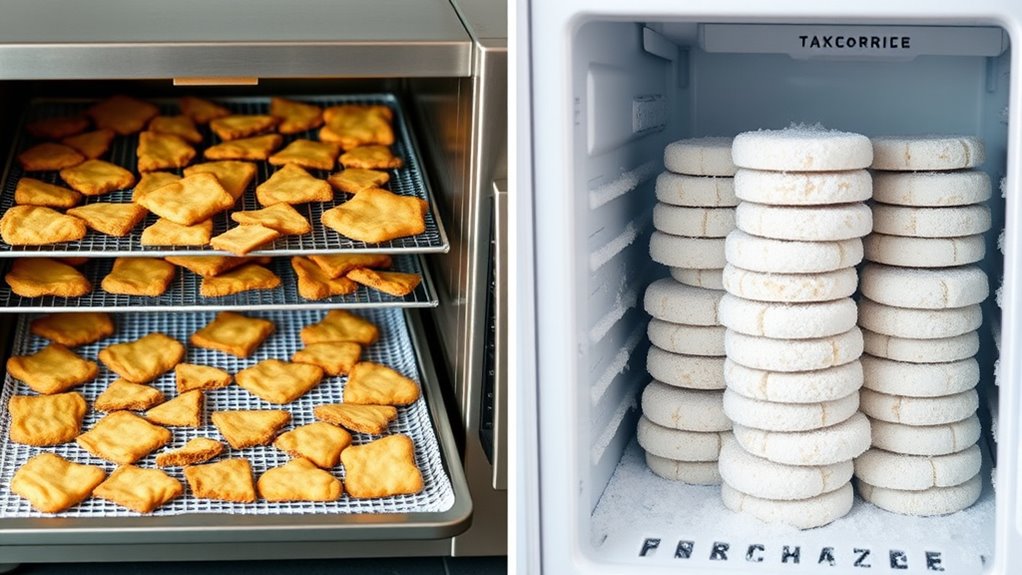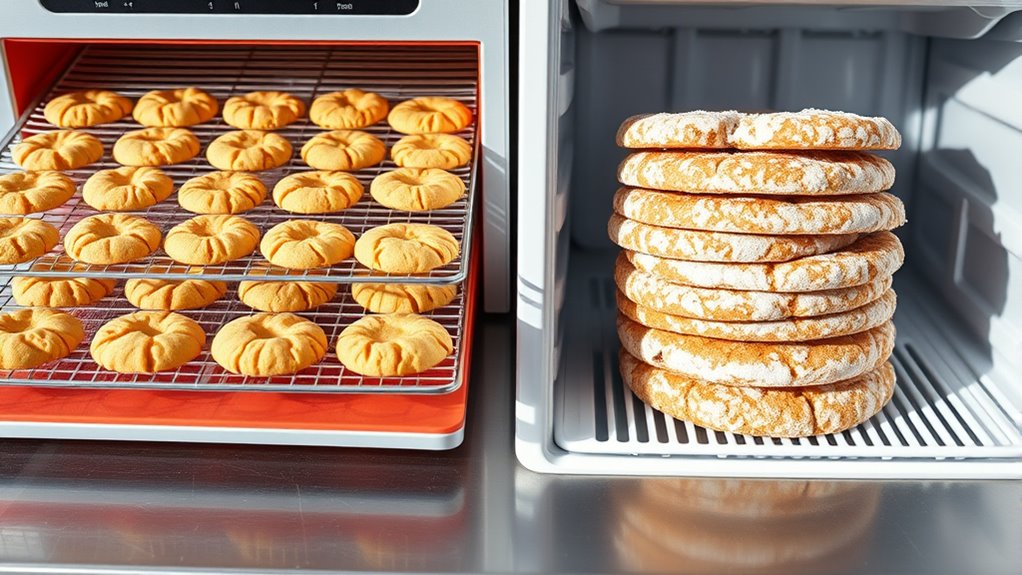Using a dehydrator or freezer can both make crunchy raw cookies, but they give different results. A dehydrator removes moisture gradually, producing lightweight, crisp snacks with a longer shelf life and slight flavor shifts from heat. Freezing, on the other hand, preserves the original moisture, flavor, and soft texture, but won’t produce instant crunchiness. To discover which method best suits your preferences and how to optimize each, keep exploring your options.
Key Takeaways
- Dehydrators produce lightweight, crunchy raw cookies by removing moisture through low heat and air circulation.
- Freezing preserves the original moist, chewy texture of raw cookies without creating immediate crunchiness.
- Dehydration maintains nutritional content and can slightly concentrate flavors, ideal for crunchy snack textures.
- Freezing locks in flavor and moisture, keeping cookies soft and fresh for long-term storage.
- Choice depends on whether you prioritize a crisp, dry snack (dehydrator) or retaining softness and moisture (freezer).

When it comes to preserving food, choosing between a dehydrator and a freezer depends on your needs and goals. If you’re aiming to make crunchy raw cookies or snacks, understanding how each method affects texture and flavor is essential. A dehydrator works by gently removing moisture through low heat and air circulation, which results in a dry, crisp texture. This method is ideal for creating lightweight, crunchy treats that retain much of the original flavor, though some subtle nuances might fade slightly due to extended drying times. On the other hand, freezing preserves food by halting microbial activity and enzyme action, locking in moisture and flavor. While freezing doesn’t produce a crunchy texture straight away, it’s perfect if you want to store raw cookies for longer periods without altering their flavor profile considerably.
Additionally, using a dehydrator can help maintain nutritional content more effectively than other drying methods, ensuring your snacks stay healthy and nutrient-rich. Your choice between these methods hinges on what you prioritize. For a crisp, crunchy raw cookie, a dehydrator is your best bet because it encourages a uniform dehydration process that yields a satisfying crunch. The texture comparison reveals that dehydrated treats are consistently crisp and lightweight, mimicking commercial dried snacks. Freezing, however, tends to maintain the original moistness and softness of the cookie, which isn’t ideal if you’re after that crunchy bite. But if you prefer a chewy or soft consistency, freezing is more suitable, especially since it preserves the intact flavor without risking any flavor loss due to heat exposure.
Flavor preservation is another key factor. Dehydration can sometimes cause slight flavor shifts because of the heat and air exposure during drying. However, it generally preserves most of the original flavors, especially if you set the temperature carefully. Conversely, freezing keeps flavors locked in by maintaining the food’s natural moisture and structure. When frozen, your raw cookies stay as close as possible to their fresh state, especially if stored properly in airtight containers. The main difference is that dehydration can intensify some flavors as moisture is removed, concentrating them in the process. Freezing, however, preserves the original flavor profile without concentration.
Frequently Asked Questions
How Does Dehydration Affect Flavor Retention in Raw Cookies?
Dehydration helps preserve the flavor of raw cookies by gently removing moisture without cooking ingredients, which maintains flavor preservation and prevents flavor loss. If you’re sensitive to ingredient flavors, dehydration minimizes the risk of altering delicate tastes compared to freezing, which can sometimes dull flavors. By controlling dehydration time and temperature, you keep ingredients fresh and vibrant, ensuring your cookies retain their original flavors while achieving that perfect crunch.
Can Freezing Alter the Texture Consistency of Raw Cookie Recipes?
Did you know freezing can cause a noticeable texture change in raw cookies? When you freeze your treats, the ice crystals can alter ingredient stability, making them crunchier or sometimes soggy once thawed. This process impacts how well your cookies hold their shape and texture over time. So, if you’re aiming for consistent ingredient stability and texture, consider how freezing might influence your raw cookie recipes before you store them.
What Are the Energy Consumption Differences Between Dehydrators and Freezers?
When comparing energy efficiency and power consumption, freezers typically use more energy than dehydrators because they run continuously to maintain low temperatures. Dehydrators are more energy-efficient since they operate at lower power levels and only run during the drying process. If you’re concerned about energy use, a dehydrator is a better option for making crunchy raw cookies, as it consumes less power overall while still achieving the desired texture.
How Long Can Raw Cookies Be Stored Using Each Method?
Think of your raw cookies as treasures waiting to be uncovered. With proper preservation techniques, you can store them for up to three months in the freezer, keeping their crunch intact. Using a dehydrator, your cookies can stay good for about 1-2 weeks at room temperature or in the fridge. Storage duration varies, but freezing offers the longest shelf life, ensuring your treats stay fresh longer.
Are There Specific Ingredients That Work Better With Dehydration or Freezing?
When choosing between dehydration and freezing, consider ingredient compatibility and flavor preservation. Ingredients like nuts, seeds, and dried fruits work well with dehydration, maintaining their crunch and flavor. Fresh berries or softer ingredients freeze better, preserving moisture and taste. You’ll get the best results by selecting ingredients suited for each method, ensuring your raw cookies stay flavorful and fresh. Adjust your approach based on ingredient characteristics to achieve ideal texture and flavor.
Conclusion
So, which method will you choose—the steady warmth of the dehydrator or the icy embrace of the freezer? Both promise crunchy, raw cookies, but each brings its own twist to your kitchen. Will you risk the wait for perfect crunch or go for quick freeze? The choice is yours, and the results could surprise you. Whichever path you take, one thing’s for sure—your taste buds are in for a delightful, crunchy adventure. Are you ready to decide?










